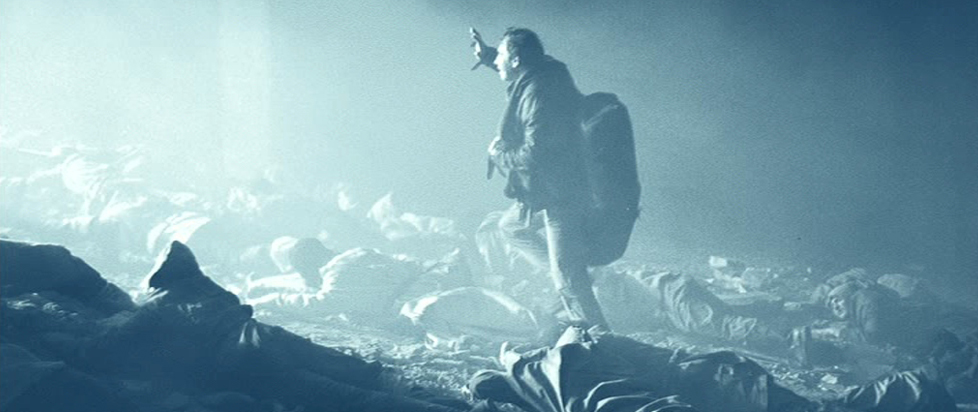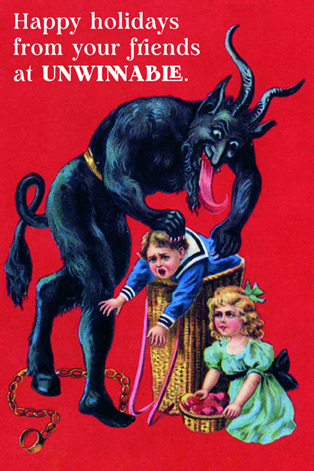
1985

This column is a reprint from Unwinnable Monthly #182. If you like what you see, grab the magazine for less than ten dollars, or subscribe and get all future magazines for half price.
———
Kcab ti nur.
———
All-aboard the dark and frosty road. This month lands us in 1985 with Piotr Szulkin’s post-apocalyptic neo-noir O-Bi O-Ba: The End of Civilization.
The world is long-dead and frozen over. All that remains is a sprawling and crumbling bunker, full of people desperate to be saved by a quasi-divine craft called “The Ark” – a myth made to get people to enter the bunker in the first place. In this, we follow our (neo-)noir protagonist Soft (Jerzy Stuhr), a fixer for the remaining authorities in The Dome.
Writer/Director Piotr Szulkin’s vision of post-apocalyptic survival in this film is a grim one. The Dome is claustrophobic and dim, the corridors are firm in their concreteness, but shot in a way that makes them feel almost non-Euclidian. The lighting alternates from clinical fluorescents in Soft’s bedroom, to Vaseline on the lens in the fur-draped home of the Dome’s wealthiest residents. Bodies litter the floors, some dying, some long dead, barely noticeable as they blur with the floors and walls. While there are violent deaths in this film, most are people whose flesh and spirits have given up altogether.
A surface read of all this can be summed up in an often-decontextualized bit of Karl Marx’s writing – “religion is the opiate of the masses.” After all, the long-promised piece of divinity is named after the vessel from the Abrahamic faiths. However, I think this film is far from that simple, and perhaps more depressing than that.
There is extensive writing on how powerful forces in the American evangelical church push it to operate as a death cult. Large swaths of people are told that through prayer (and money) they must support endless horrors and allow the present to rot with the promise that this will inevitably lead to the conditions for us to leave this earthly plane. It is specifically with this in mind that many of its loudest preachers can urge support for apartheid and genocide in the Levant – with everyone there operating as a means to speedrun through the prophecies in the final book of the Bible.

However, I think the faith of this film is actually more akin to the one that I grew up around – that of the colonized. Both radical Indigenous and Black scholars often write of European colonialism as the start of an apocalypse – destroying the world that was and forcibly building something new on top of it. Following this, Szulkin’s Dome feels analogous to the worst elements of how a colonial Christianity is deployed in post-colonial countries. A substantial sequence of the film is devoted to the step-by-step quest of bartering and manipulating that Soft has to go on just to get a fresh onion which he can meticulously peel and eat. As he does this, half the onion which we have spent so much time watching him work for is casually taken and eaten by his superior. Elsewhere, a man barks and barks for the entertainment of some people in the dome in the hope they’ll give him one of their crackers. In the midst of all this, the people move to fine-tuned teachings about the Ark that focus all eyes on a world beyond. Throughout the real-world imperial periphery, preachers (often funded by Western churches) teach a restrictive version of religious doctrine which allows no room for collective action, at the same time as state forces kill, exile or co-opt those who see through the ruse.
The most striking thing in this film for me is how Szulkin pinpoints that an enlightened distance won’t save you either. Soft knows that the Ark is a lie, operating from a cold cynicism, and he is still as subject to the end of the world as everybody else.

One of the more interesting dynamics of the film is between Soft and a very peculiar unnamed man (Krzysztof Majchrzak) who insists that he has a foolproof way to survive the crumbling dome. As he reappears across the film, we learn more about him and Majchrzak’s performance moves gradually from bizarre to deeply chilling. As Soft learns more about the man, he becomes increasingly disgusted, with the full reveal of the man’s plan revealing itself to be in equal parts pathetic and grotesque in a particularly misogynistic direction. However, the reality is that Soft’s pursuits are less different than he’d like to believe (albeit less blatantly violent). Soft also ends up searching desperately for a way out of the Dome that is doomed to fail, he also unrelentingly seeks to push the woman he loves (Gea, played by Krystyna Janda) into joining him in the world beyond – treating her more as a muse than anything close to embodied. Stuhr gives that explosion of disgust, and for a moment on his face you’re not sure whether Soft is more disgusted with the horrors or himself.
The ultimate hollowness of any gains Soft’s cynical distance is shown most clearly in a hallucination he has at the end of the film. He is quite literally outside himself. He watches a mirror image with his love drift away on an imaginary hot air balloon while he is left alone on the ground. It’s a miserable sight. The quick-witted self-serving rationalist as cold and alone as the rest.
This is not a film which offers an easy or comforting out, so I won’t contort this column into one either. Maybe today it’s enough to take in the full scale of the beasts we face, and tomorrow we can worry about how to slay them.
———
Oluwatayo Adewole is a writer, critic and performer. You can find her Twitter ramblings @naijaprince21, his poetry @tayowrites on Instagram and their performances across London.




